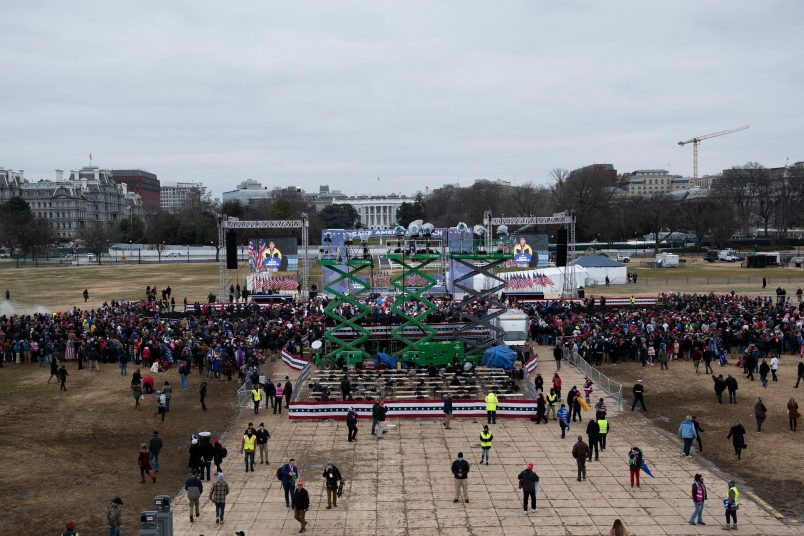Former President Trump cannot block the House Jan. 6 Committee from accessing executive branch records created during his administration, a federal judge ruled on Tuesday evening.
The ruling from U.S. District Judge Tanya Chutkan for the District of Columbia beats back an attempt by Trump to assert a power that largely belongs to sitting presidents, not former presidents: the ability to declare large swaths of information off-limits due to executive privilege.
In the lawsuit, filed in October, Trump sought to expand the ability to declare executive privilege to former presidents like himself, while arguing that the Jan. 6 Committee’s subpoena was too broad and lacking in legislative grounding to be lawful.
“The court holds that the public interest lies in permitting—not enjoining— the combined will of the legislative and executive branches to study the events that led to and occurred on Jan 6 and to consider legislation to prevent such events from ever occurring again,” Chutkan’s ruling reads.
Per the subpoena, the National Archives has to begin complying on Friday, handing over dozens of schedules, notes, visitor logs, and other documents created by senior White House officials during the attempt to subvert the 2020 election.
Trump already signaled his intention to appeal Chutkan’s ruling in a filing this week, asking to be allowed to do so before she came to a decision on the matter.
Were Trump to prevail on his executive privilege claim, it could short-circuit a main avenue of accountability for all former presidents investigated for wrongdoing that took place while in office.
Chutkan held that Biden, the sitting President, gets deference on claiming executive privilege. As a former President, Chutkan found, Trump’s rights to assert the privilege come second to that of the current occupant of the White House.
“Presidents are not kings, and Plaintiff is not President,” Chutkan wrote.
At a Thursday hearing in the case, House general counsel Doug Letter faced tough questions from Chutkan over the breadth of the subpoena. The judge in particular focused on why the panel wanted documents going back to April 2020.
In the ruling, Chutkan let the subpoena stand without alterations.
“The court notes that the Select Committee reasonably could find it necessary to investigate the extent to which the January 6 attack on the Capitol may have been an outgrowth of a sustained effort to overturn the 2020 election results, involving individuals both in and outside government,” she wrote.
The ruling deals a big blow to Trump, whose attorney Justin Clark failed to persuade Chutkan at the Thursday hearing that the former President stood to suffer any real harm from the documents’ disclosure.
Trump is likely to immediately appeal the ruling before the National Archives complies with the subpoena by its Friday deadline.
At the same time, Chutkan found that Trump could not use favorable rulings he secured during his own administration to stymie House investigations in this case. Chutkan found that the Jan. 6 subpoena was well-founded and that Trump, who is no longer president, cannot state a harm he would suffer from the subpoena going forward.
Chutkan makes repeated reference to Biden’s decision not to asset the privilege. Trump had argued that he was trying to “protect” executive privilege, but Chutkan notes that, as President, it’s Biden’s decision to make.
She added that there was no discernible separation of powers conflict – both Congress and the White House are in agreement on handing over the records.
Trump had asked Chutkan to review the records document by document – a time-consuming process for a short probe.
“The court will not second guess that decision by undertaking a document-by-document review that would require it to engage in a function reserved squarely for the Executive,” she wrote.
The ruling is a historic first, striking down a claim filed by a former President seeking to block an investigation into an insurrection that he orchestrated. It’s a record of first kinetic contact between Trump and the judiciary’s view of Jan. 6.
“This unprecedented attempt to prevent the lawful transfer of power from one administration to the next caused property damage, injuries, and death, and for the first time since the election of 1860, the transfer of executive power was distinctly not peaceful,” the ruling reads.
Read the filing here:







Well, now. Guaranteed to be an interesting 72 hours as the flailing of the flabulous former reaches a ruddy peak in anticipation of accountability.
So they have two days (weds, thurs) to get the DC appellate court to issue a stay. One in three chance of landing Neomi Rao on the 3 judge panel, to give her a chance to issue another one of her “you can’t subpoena the president’s docs unless you’re already investigating the president” opinions.
I kind of wish she’d just held her decision until Monday…or maybe Friday afternoon after the Archives released info.
Silly judge is never gonna make the supreme court if she keeps doing this working nights and weekends thing. It’s unseemly, simply not done in the highest court of the land. At least, not for congressional subpoenae.